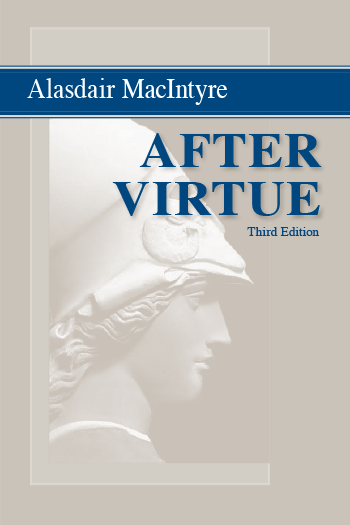
“[M]odern politics cannot be a matter of genuine moral consensus. And it is not. Modern politics is civil war carried on by other means. . . .
“[P]atriotism cannot be what it was because we lack in the fullest sense a patria . . . . [T]he practice of patriotism as a virtue is in advanced societies no longer possible in the way that it once was. In any society where government does not express or represent the moral community of the citizens, but is instead a set of institutional arrangements for imposing a bureaucratized unity on a society which lacks genuine moral consensus, the nature of political obligation becomes systematically unclear. Patriotism is or was a virtue founded on attachment primarily to a political and moral community and only secondarily to the government of that community; but it is characteristically exercised in discharging responsibility to and in such government. When however the relationship of government to the moral community is put in question both by the changed nature of government and the lack of moral consensus in the society, it becomes difficult any longer to have any clear, simple and teachable conception of patriotism. Loyalty to my country, to my community—which remains unalterably a central virtue — becomes detached from obedience to the government which happens to rule me.
“Just as this understanding of the displacement of patriotism must not be confused with the liberal critique of moral particularity, so this necessary distancing of the moral self from the governments of modern states must not be confused with any anarchist critique of the state. Nothing in my argument suggests, let alone implies, any good grounds for rejecting certain forms of government as necessary and legitimate; what the argument does entail is that the modern state is not such a form of government. It must have been clear from earlier parts of my argument that the tradition of the virtues is at variance with central features of the modern economic order and more especially its individualism, its acquisitiveness and its elevation of the values of the market to a central social place. It now becomes clear that it also involves a rejection of the modern political order. This does not mean that there are not many tasks only to be performed in and through government which still require performing: the rule of law, so far as it is possible in a modern state, has to be vindicated, injustice and unwarranted suffering have to be dealt with, generosity has to be exercised, and liberty has to be defended, in ways that are sometimes only possible through the use of governmental institutions. But each particular task, each particular responsibility has to be evaluated on its own merits. Modern systematic politics, whether liberal, conservative, radical or socialist, simply has to be rejected from a standpoint that owes genuine allegiance to the tradition of the virtues; for modern politics itself expresses in its institutional forms a systematic rejection of that tradition.”
—from Alasdair MacIntyre, After Virtue (University of Notre Dame Press, second edition 1984)